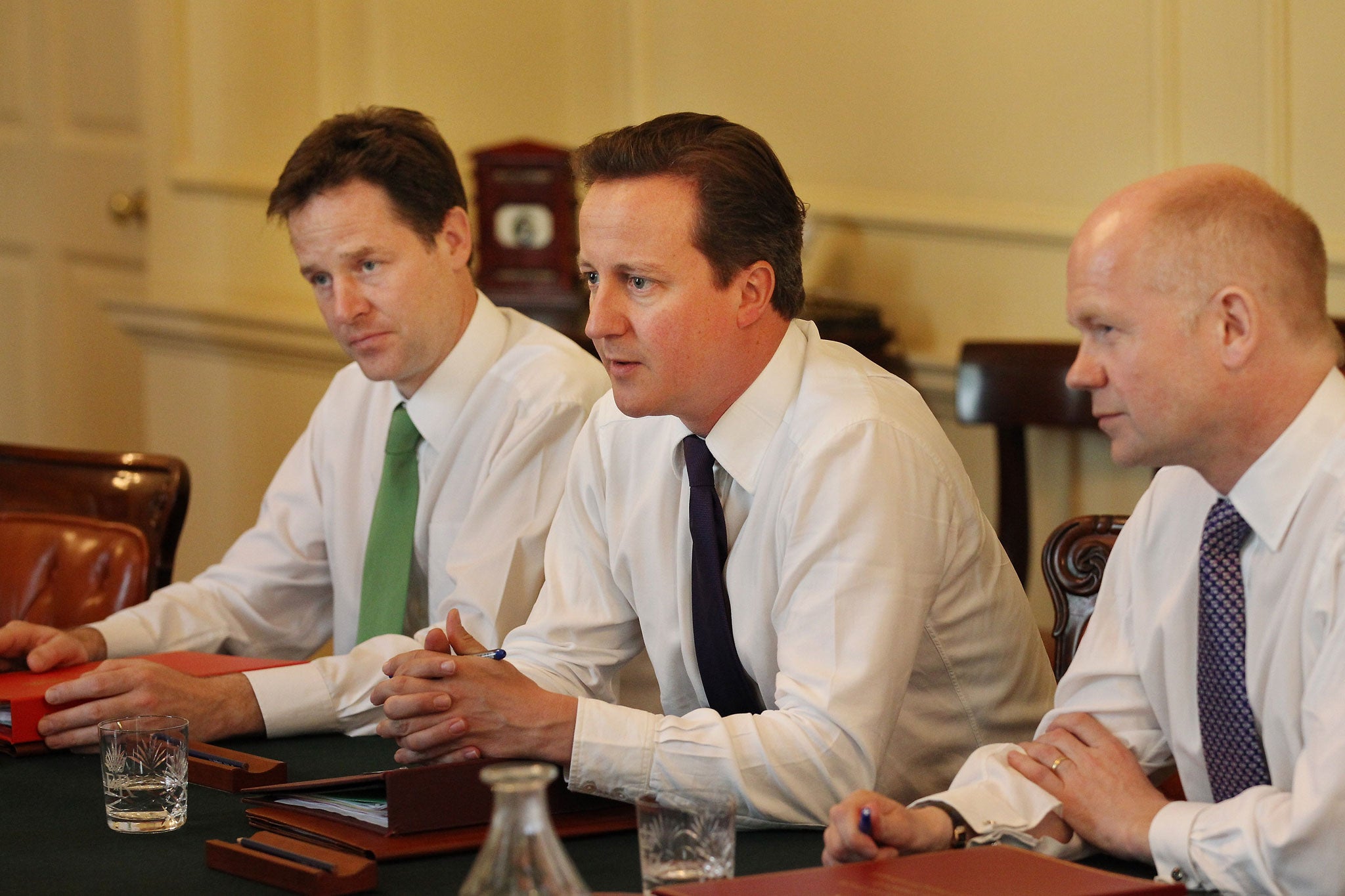The Coalition marriage is increasingly tetchy and ‘open’ as the Lib Dems (allegedly) play footsie with potential new partners
There won’t be a divorce before the May 2015 election


Another week, another spat between the Conservatives and Liberal Democrats. This time Nick Clegg’s party is accusing David Cameron and the Tories of blocking plans to allow voters to sack MPs behaving badly by triggering a by-election.
Relations between the Coalition partners are increasingly tetchy. Many Tory backbenchers have never liked the partnership but the hostility is spreading to Tory ministers. They sense that the “playing footsie” index between the Lib Dems and Labour has reached a new high to prepare for a possible deal after next year’s general election.
“It’s an open marriage now; we still live in the same house but we know the Libs are seeing someone else,” said one Tory Cabinet minister.
There won’t be a divorce before the May 2015 election. Mr Cameron and Mr Clegg have invested too much in this marriage of convenience. Their relationship is business-like rather than warm, but still works. When they sat down recently to talk about the Queen’s Speech for the final year of the Parliament, the newspapers were awash with headlines about Coalition splits, but they still had a workmanlike discussion.
Tory ministers accuse the Lib Dems of picking more and more public fights as they try desperately to revive their flatlining opinion poll ratings. The Tories have taken a vow not to amplify the Lib Dem message by retaliating – in public, at least. They are certainly whingeing in private. “It’s just posturing,” another Cabinet minister said. “The Lib Dems are crying out for attention. We won’t help them define themselves against us by hitting back.”
This dovetails with the Tories’ plans to portray next year’s general election as a choice between Mr Cameron and Ed Miliband. They will ignore Mr Clegg and ruthlessly claim sole ownership of the flagship Lib Dem policy of raising the personal tax allowance to £10,000 a year. That’s politics.
The Lib Dems insist they are merely reacting to the Tories’ policies and decisions on their merits, not pandering to voters. They say they have been highlighting their differences with the Tories since 2011, after proving that “coalition works” in the Government’s first year. Mr Clegg is frustrated when his carefully drafted speeches, attacking the Tories and Labour in equal measure, are reported as the Coalition doing the splits (again).
His speech on the economy this week was a case in point. He called for faster deficit-reduction after the election than Labour is proposing, but most papers reported his dispute with the Tories over future tax rises and spending cuts. It’s a big communications headache for the Lib Dems. Young journalists are taught that dog bites man is not a story, but man bites dog is. Governing party bites Opposition is not news, but a dogfight between two Coalition parties is. The wider challenge for Mr Clegg is to show the Lib Dems are different to the two biggest parties without making the Government look divided and shambolic.
The Deputy Prime Minister is adamant that his party is positioned bang in the middle of the big two. Indeed, it would be completely mad to be anywhere else. Hinting at a preference for Labour or the Tories would scare off one chunk of potential Lib Dem voters. And Ed Miliband appears to think the centre ground is moving left, while the Tories are sometimes tempted to veer right to combat Ukip.
Although it is often assumed that all the voters the Lib Dems have lost since 2010 have switched en bloc to Labour, the picture is more complex. Some have gone to Ukip, even though the Lib Dems have precious little in common with Nigel Farage, but one in five Lib Dem deserters are “don’t knows” and therefore could potentially be won back.
The Lib Dems’ private polling suggests that, in addition to the 10 per cent who will support the party at the general election, a further 15 per cent would consider doing so. If the Lib Dems could persuade half of these “considerers” to support them, they might well hold the balance of power again.
Not that this would guarantee another coalition. Senior civil servants, who rightly assumed the economic crisis would mean a full-scale coalition if the 2010 election ended in a hung parliament, are dusting down the procedures for a looser “confidence and supply” agreement, in which the Lib Dems would support a minority Tory or Labour government in key Commons votes.
“This time round the economy is in a recovery stage,” Lord (Gus) O’Donnell, the former head of the Civil Service, told a Commons committee nine days ago. He said “the temptation” for the biggest party would be to form a minority government for 12 to 18 months and then claim the credit for an improving economy at another general election. So Mr Clegg could “win” but still lose his place at the Cabinet table.
Join our commenting forum
Join thought-provoking conversations, follow other Independent readers and see their replies
Comments
Bookmark popover
Removed from bookmarks